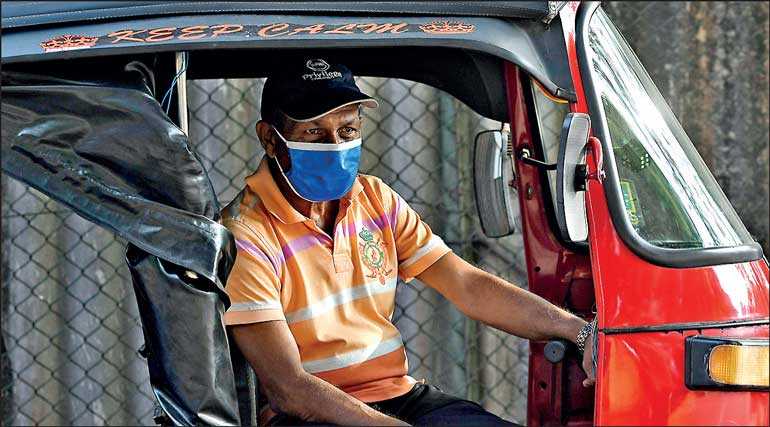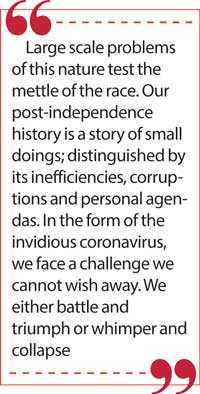Friday Feb 20, 2026
Friday Feb 20, 2026
Friday, 20 March 2020 00:00 - - {{hitsCtrl.values.hits}}

Who would have thought that something sounding like a brand of one of those sleek fuel-efficient Japanese cars would pose such an existential threat to the entire human race!? 
Ebola was a threat in faraway West Africa, SARS mainly a problem for the omnivorous Asians (Chinese!), dengue strikes those who cannot keep a clean backyard, but this virus, COVID-19, is not discriminating; striking all colours, sizes and ages, with no respect for power or wealth. Today, there is no human being on earth out of the reach of this scourge, and there is no sure answer in the medicine.
Relative to many countries, Sri Lanka is only marginally affected, with just over 40 (until 17 March) reported cases thus far. We are a small country with little international travel, unlike global centres such as Singapore or Dubai, where millions transit through on a daily basis.
There is only one international airport to talk of in Sri Lanka, and our harbours, in comparison to the behemoths in the region, are small operators with very limited traffic. This miniature scale becomes an advantage when fighting a plague like coronavirus, making it is easier to organise counter measures, to shut down and isolate.
The coronavirus threat seems to have brought out the best as well as the worst in us. Although the internet is overloaded with information about precautionary measures, there does not seem to be a standard approach in the tending of the afflicted.
Typically, there is a lot of false information made worse with fear stories doing the rounds. It is reported that in certain hospitals, at the lower levels, particularly the attendants and medical assistants avoided infected persons through fear of contracting the disease. If true, this is not only an act of cowardice but also an unbelievable dereliction of duty.
All over the world, the medical services are scrambling to contain the disease, with scant regard to the possibility of contamination. In America, 10 healthy volunteers have undergone initial jabs in the accelerated search for a vaccine. The scope of the threat posed by this virulent virus is such that only nations with the strongest hearts and the bravest souls can overcome. Singapore has proved that she is not only capable of a magnificent performance in normal circumstances, but also can come out shining, when put to extreme test.
An infected person, unaware of the fact, could innocently pass on the virus to hundreds. But being aware of the inherent danger of uncontrolled contact, to indulge in mass sporting events like ‘big matches’ defies common sense. How an English game, at educational institutions created by an alien culture, have come to represent ‘tradition’ for the recipients, perhaps is best understood by the pervasive mediocrity of the country. A foreign idea can be introduced to a conquered country, but its interpretation in the hands of the recipient, can be tentative.
In the early days, to the befuddled native student, the opportunity to gather with fellow youth (Invariably at church-run schools) to cram-up on strange subjects (geography, history, arithmetic, Latin!) would have been an intriguing experience, a way better existence than helping the adults in arduous field work.
Then sports, cricket, how exhilarating! He would soon have realised that all this “education” and “sports” placed him in a very privileged position in comparison to his poor cousin tending to the field buffalo in the village. But there is the undeniable, he may be privileged in comparison to his fellowmen, but in the large scheme of things he remains mediocre, perhaps considered somewhat of a cultural oddity, a corrupt one at that. His creativity is very limited, productivity below global standards, out there in the larger world, he gets no “respect”. “Baila” songs (Portuguese/kaffir origin) and the “papaera” band (no claimants for that racket!) provides the raucous score for the drunken rumpus. If truth be told, our schools are unremarkable, dependent solely on outside tuition to pull the student through to a university, themselves better known for the barbaric rag of the freshers, than the scholarship they impart.
In sports and athletic events, we hardly qualify to compete at international levels, barely entering the Asian Games portal, forget about the Olympics. But a game of cricket between a few teenagers has become a massive event, declared a tradition, the proceedings in the burning sun mesmerising successive generations; emptiness begets emptiness. In most cultures, a tradition is given rise to by a social necessity or achievement, but here in this culture; letting down of accepted standards, diminution of discipline and the unreining of baser instincts is openly declared a tradition. Unsurprisingly, what the prominent schools in Colombo do, are imitated through the country, smaller provincial schools also claiming a day when laws of the land as well as their sense of decorum, are suspended.
While this unintelligent melee provided the coronavirus an unhindered breeding ground, there are a few good men at work to prevent the virus overwhelm the country. The Government-run medical services are working around the clock, under-staffed, with limited resources, they are in the forefront of a life and death struggle. Supporting them closely are the members of the armed forces, working tirelessly, transporting the afflicted, looking after them, building infrastructure, creating purpose built hospital wards, tracing virus carriers, all these activities potentially life threatening to the service provider.
Here again, we see the weaknesses of our million plus public service, unable to adequately respond to emergencies without falling back on the armed forces. One of the often cited features of a failed State is an inadequate (and corrupted) public sector, incapable of providing essential services while holding the system together with an independent and objective approach. Once again, the men and women of our armed forces are proving to be the best among us.
With the closures and lockdowns necessitated by the coronavirus will come economic hardships for many. There are millions working in small enterprises and the informal sector, dependent on daily incomes. On a day like today, no taxi driver will earn a living, leaving his family vulnerable. Yet he has to repay the car loan and also settle the credit card which he uses for daily provisions. Equally hit is the large hotel sector, now facing lockdown, while barely out of the Easter Sunday disaster of last April. The Government and the public service must act immediately to get control of the situation.
Large scale problems of this nature test the mettle of the race. Our post-independence history is a story of small doings; distinguished by its inefficiencies, corruptions and personal agendas. In the form of the invidious coronavirus, we face a challenge we cannot wish away. We either battle and triumph or whimper and collapse.